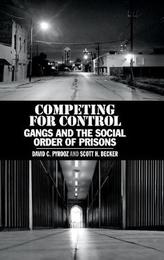
|
Competing for Control: Gangs and the Social Order of Prisons
Hardback
Main Details
| Title |
Competing for Control: Gangs and the Social Order of Prisons
|
| Authors and Contributors |
By (author) David C. Pyrooz
|
|
By (author) Scott H. Decker
|
| Physical Properties |
| Format:Hardback | | Pages:310 | | Dimensions(mm): Height 234,Width 157 |
|
| ISBN/Barcode |
9781108498357
|
| Classifications | Dewey:365 |
|---|
| Audience | | Tertiary Education (US: College) | | Professional & Vocational | |
|---|
| Illustrations |
Worked examples or Exercises; 17 Tables, black and white; 35 Line drawings, black and white; Worked examples or Exercises; 17 Tables, black and white; 35 Line drawings, black and white
|
|
Publishing Details |
| Publisher |
Cambridge University Press
|
| Imprint |
Cambridge University Press
|
| Publication Date |
29 August 2019 |
| Publication Country |
United Kingdom
|
Description
Pyrooz and Decker pull apart the bars on prison gangs to uncover how they compete for control. While there is much speculation about these gangs, there is little solid research. This book draws on interviews with 802 inmates - half of whom were gang members - in two Texas prisons; one of the largest samples of its kind. Using this data, the authors explore how gangs organize and govern, who joins gangs and how they get out, the dark side of gang activities including misconduct and violence, the ways in which gang membership spills onto the street, and the direct and indirect links between the street and prison gangs. Competing for Control captures the nature of gangs in a time of transition, as prison gangs become more horizontal and their power is diffused across groups. There is no study like this one.
Author Biography
David C. Pyrooz is Associate Professor of Sociology and Faculty Associate of the Institute of Behavioral Science at the University of Colorado Boulder. His research interests are in the area of gangs and criminal networks, developmental and life-course criminology, and incarceration and re-entry. Scott H. Decker is Foundation Professor in the School of Criminology at Arizona State University. His main research interests are in gangs, violence, and active offenders. He is the author of Life in the Gang: Family, Friends and Violence (1996) and Policing Immigrants: Local Law Enforcement on the Front Lines (2016).
Reviews'Competing for Control is a very important work which will surely generate significant discussions in virtually any classroom. It is a must-read for those of us in academe, as well as anyone who works in a correctional facility (or perhaps even resides in one).' Robert M. Worley, Theory in Action 'This fascinating book takes readers inside the prison system and explains how it operates on a day-to-day basis.' E. Smith, Choice 'Overall, then, this is a theoretically strong, well-written, and insightful book, which will no doubt become a key text for criminologists and penologists in the years to come.' Dev R Maitra, British Journal of Community Justice 'This study will long stand as a tour de force in this field - for four important reasons. First, there is no other study of gangs inside prisons that rivals theirs. Second, the public policy import of their research provides guidance for prison administrators in future programming that surely will produce worthwhile benefits in the enterprise of controlling prison gang violence. Third - and most important - future generations of gang researchers will view this book as a foundational body of research on prison gangs, in the same way that Thornberry and colleagues' (2003) book was the first longitudinal study of gang membership from childhood into adulthood, and it inspired numerous other such studies. Fourth, Pyrooz and Decker utilized a rigorous study methodology.' Buddy Howell, Criminal Justice and Behavior 'The book stands as an exemplar of social science. Grounded in theory and the collection of data specifically suited to stimulate and test theoretical arguments, it hits on all pistons - generating knowledge about social order in general, social order in prisons more specifically, and then, still more specifically, gangs.' Dan Mears, ACJS Today
|